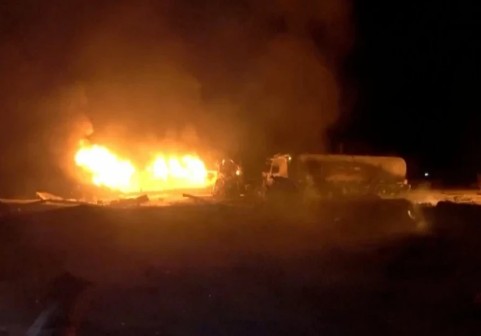Sanaa: The death toll from US air strikes on Yemen’s Ras Isa fuel port has risen to 80, with an additional 150 people injured, according to health authorities controlled by the Houthi group. The strikes occurred on Thursday night, targeting the port and several concrete tanks used to store imported fuel.
Among the victims are port workers, including five paramedics who were killed upon arriving at the scene in ambulances during the second wave of air strikes following initial attacks. This incident marks the deadliest attack since the US resumed air strikes against Houthi targets in mid-March.
More than 14 air strikes were reported over two waves, resulting in significant destruction of the concrete tanks and igniting large fires, which were extinguished within hours. A resident confirmed that the casualties included port employees, truck drivers, contracted workers, and civilian trainees, with rescue teams also targeted in subsequent strikes.
Located northwest of Yemen’s Red Sea city of Hodeidah, the Ras Isa port has been crucial for importing fuel into areas controlled by the Houthi group, which has maintained control over extensive regions in northern Yemen since the onset of the civil war against the government in late 2014.
The US Central Command (USCENTCOM) issued a statement confirming the air strikes aimed at destroying Ras Isa to “eliminate this source of fuel for” the Houthis and to “degrade the economic power” of the group. USCENTCOM alleged that the Houthis benefit economically and militarily from the support received from countries and companies, describing the group as a designated foreign terrorist organization since its redesignation under President Donald Trump.
According to USCENTCOM, the Houthis use fuel to sustain their military operations, as leverage for control, and to profit economically from the importation. Following the air strikes, Yemeni Information Minister Moammar al-Eryani accused the Houthis of turning the port from an economic facility meant to serve Yemenis into a hub for smuggling weapons and fuel.
Meanwhile, Minister of Oil and Minerals Saeed al-Shamasi confirmed that government-controlled ports in Aden, Nishtun, Mukalla, and Mocha are prepared to handle fuel and food shipments sufficient to meet market demands across Yemen.
In response to the air strikes, the Houthis condemned the attacks as “a full-fledged war crime” and dismissed accusations from the US and Yemeni government, asserting that “the port is a civilian facility, not a military one.” They further claimed that the US strikes aimed to bolster Israel’s actions against the Palestinian people.
The Houthis vowed to continue their “support operations” for Palestinians and warned citizens in northern Yemen that “the oil supply is stable,” while threatening retaliation for the US actions. On the same day, the Israeli military reported intercepting a missile believed to have been launched from Yemen by the Houthis, interpreted as a response to the US air strikes.
In mid-March, Trump had ordered “decisive and powerful military action” against the Houthis after they declared plans to resume attacks on Israeli targets, citing Israel’s blockade of humanitarian aid to Gaza as a justification.

